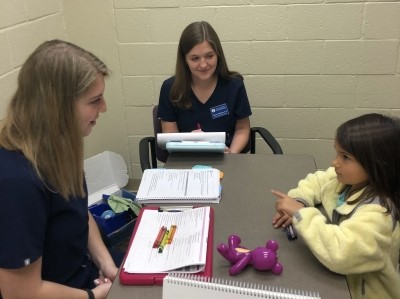University Clinic
 The Auburn University Speech and Hearing Clinic (AUSHC) is located in the heart of campus and operates year-round. Students collaborate with clinical faculty to provide approximately 80 sessions per week for individuals across the life span. Four full-time clinical faculty and one clinical instructor support the students in implementing their treatment plans. Therapy is provided primarily face to face; however, telepractice is available when appropriate. Caregivers are encouraged to watch from observation rooms and engage in sessions to facilitate generalization.
The Auburn University Speech and Hearing Clinic (AUSHC) is located in the heart of campus and operates year-round. Students collaborate with clinical faculty to provide approximately 80 sessions per week for individuals across the life span. Four full-time clinical faculty and one clinical instructor support the students in implementing their treatment plans. Therapy is provided primarily face to face; however, telepractice is available when appropriate. Caregivers are encouraged to watch from observation rooms and engage in sessions to facilitate generalization.
Voice, Upper Airway and Swallowing Clinic
The Auburn University Speech and Hearing Clinic offers evaluation and treatment services for individuals through the lifespan who are referred for voice disorders, resonance disorders, chronic cough, inducible laryngeal obstruction, swallowing impairment, and gender affirming voice care. This clinic is nationally recognized for expertise in the areas of professional voice rehabilitation and upper airway disorders. The clinic routinely conducts flexible or rigid endoscopic, acoustic, and aerodynamic assessment of laryngeal function as well as flexible endoscopic evaluation of swallowing function (FEES).
Off-Campus Placements
Students have practicum opportunities available at a variety of off-campus sites organized by the external placement coordinator. Students are typically placed for one semester two to three times weekly at an off-campus site to meet the minimum practicum requirements established by ASHA prior to the internship. Off-campus practicum sites include preschools, outpatient clinics, public schools, private practices, adult rehabilitation centers and local hospitals.
Internships
An off-campus internship is an essential component of the graduate training program in speech-language pathology. Students typically enroll in this full-time field experience during the last semester of their program, after they have completed all the academic requirements for the master’s degree. Students may apply to a variety of facilities and in a location of their choice.
Interprofessional Experiences
- Nursing Simulation – The department collaborates with the School of Nursing to plan and organize the diagnosis and treatment of a simulated patient. These simulations focus on aphasia and dysphagia and collaboration in diagnosis and treatment. Simulations occur twice annually and are guided by clinical faculty.
- Interprofessional Education Course with Audiology – Audiology and Speech-Language Pathology graduate students collaborate to earn clinical hours across a variety of disorders and ages. Students learn from case studies and determine potential next steps for the patient.
- Simulations – Simulations are completed throughout the fall, spring and summer semesters of the program’s first year. These case studies increase the breadth and depth of the student's exposure to all areas of evaluation and treatment.
- TBI Camp – Auburn University hosts the Bright Ideas TBI Camp annually. This therapy-based camp is offered through the Alabama Head Injury Foundation and is designed to help survivors and caregivers learn new strategies and gain awareness of potential resources in their area. Students work with Occupational Therapy, Kinesiology, Audiology, and Social Work to create a comprehensive plan of care for participants.
- Outreach Screenings – Graduate students collaborate with other disciplines to provide hearing and language screenings in surrounding communities. Screenings are offered in a variety of locations, such as assisted living facilities, Head Start and daycares.
EAGLES Classes
Auburn University is home to the EAGLES (Education to Accomplish Growth in Life Experiences for Success) program, which is a comprehensive transition program for students with intellectual disabilities. Graduate students have the opportunity to serve and interact with the EAGLES students by leading social skills classes using an evidence-based curriculum.